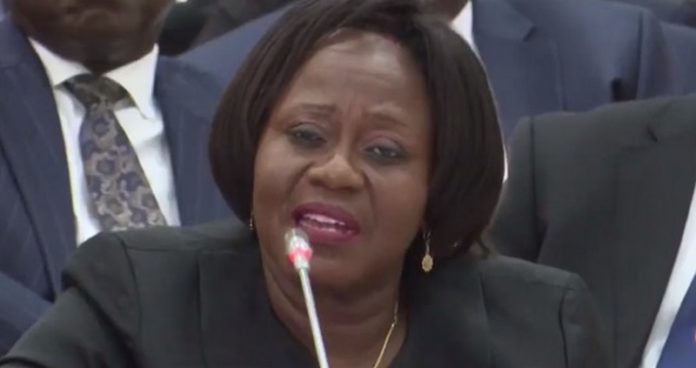Chief Justice Gertrude Torkornoo has appealed to the Supreme Court to intervene and stop what she describes as a coordinated and degrading campaign to oust her from office.
She warned that the very foundation of judicial independence in Ghana is under attack.
In a supplementary affidavit in support of her motion for an interlocutory injunction, Justice Torkornoo lays bare a string of events she believes demonstrate “a complete desecration of [her] basic constitutional rights,” including the right to a fair hearing, dignity, and protection from inhuman treatment.
“This Honourable Court is the only shield between me and an unconstitutional assault on the office I hold and the independence it symbolises,” she wrote.
“Only you can stop this assault on judicial independence.”
She contends that the inquiry process initiated against her and the conduct of the committee set up by the President have been marked by blatant violations of due process and personal indignity.
“I have been treated in a manner not meted out even to persons on trial for treason,” she stated in the affidavit, calling the treatment degrading and mentally torturous.
Justice Torkornoo’s grievance stems not only from the substance of the allegations against her—details of which she says have never been properly communicated—but from the process itself.
She revealed that she has not been informed of the legal basis on which a prima facie case was determined, nor of the specific allegations she is required to answer.
“How can I defend myself when I don’t even know what I’m defending against?” she asked.
She described how her lawyers were sidelined during a crucial committee sitting on May 15, despite receiving formal notice of the hearing.
“The committee simply refused to recognise my counsel because I was not physically present,” she noted incredulously.
When she eventually appeared before the committee on May 22 with her legal team, they informed the members about her Supreme Court suit.
The committee adjourned for a day and requested copies of the legal filings. But by May 23, Justice Torkornoo says, the committee “shockingly” announced its intention to proceed regardless—even though the injunction application was now before the highest court of the land.
What makes matters worse, she said, is the committee’s decision to allow petitioners to call external witnesses rather than appear and testify themselves.
“This is not just irregular. It is offensive to the basic rules of inquiry,” she argued. “Petitioners must be subject to cross-examination. That’s what justice demands.”
The Chief Justice also paints a disturbing picture of the treatment she has been subjected to at the hearings, held not at the Judicial Service’s Court Complex like previous Article 146 processes, but at the Castle, Osu, a high-security zone.
There, she says, her husband and children were barred from entry, she and her lawyers were denied access to phones and laptops, and she was personally searched.
Meanwhile, she alleges, the petitioners’ counsel moved freely with phones and other devices.
“These actions are not merely procedural irregularities,” she said. “They are deliberate tactics designed to mentally break me and tarnish the dignity of my office.”
Justice Torkornoo argues that all previous removal proceedings against judges under Article 146 have taken place at the Courts Complex—a venue she describes as the appropriate judicial setting. The move to the Castle, she insists, “boggles the mind” and signals an effort to intimidate.
Calling the entire process a “mockery of justice” and “a ruse to unjustifiably remove me from office,” she prays that the Supreme Court immediately halt the process by granting an interlocutory injunction.
“This is bigger than me,” she warns. “What is at stake is the security of tenure for every justice of the Superior Courts of Judicature. What is under threat is the very soul of our Constitution.”
Source: Ibrahim Abubakar
ALSO READ:



